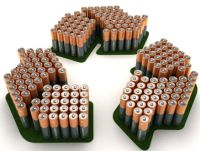

In January 2010 new legislation came into force that require retailers selling batteries to provide collection and recycling facilities for their eventual disposal. Some town halls, libraries and schools will voluntarily offer the service, typically in the form of a cardboard box by the door.
The rules, part of the EU's Batteries Directive 2006/66/EC, are meant to deal with the thousands of tonnes of harmful metals that pollute the environment when used batteries are burned or put into landfill. We use 600 million batteries every year - an average of 21 per household - but the UK has a dismal record in recycling them. The overwhelming majority, 97 per cent, are thrown into domestic bins and end up in landfill, where their toxic metals lead, cadmium and mercury leach out into ground and pollute water courses.
The legislation states that those who manufacture, import or produce one tonne of batteries or those who place products containing batteries onto the UK market will be responsible for the collection, treatment and recycling of the waste batteries in proportion to their market share. The system has been made as easy as possible for consumers to recycle their batteries. Everything from AAA cells to mobile phone batteries and button cells used in hearing aids and watches, must be separated from household rubbish and placed into designated recycling bins in shops or other recycling points.
Bob Mead, the Environment Agency's project manager said, "The retailers themselves are required to do nothing more than provide a point where one of these collection bins can be placed. They have no responsibilities themselves in treating or recycling the batteries they collect. They merely have to phone up one of the compliance schemes and say I've got some batteries so come and take them away from me." This allows retailers to get the recycled batteries collected for free by an approved Battery Compliance Scheme.
The Waste Batteries and Accumulators Regulations SI 2009/890 is the latest attempt, following the Landfill and WEEE Directives, to transform the UK into a greener society which dumps fewer materials and implements the EU Batteries Directive, which set a series of targets for the recycling of portable batteries used to power toys, torches and other gadgets. In 2007 we saw just 3% of batteries being recycled and the rest going to landfill. The UK is aiming to meet targets of 25% recycling of batteries by 2012 and 45% by 2016. The Department for the Environment, Food and Rural Affairs (Defra) estimates that hitting the 2016 target could save 12,000 tonnes of carbon dioxide emissions annually.